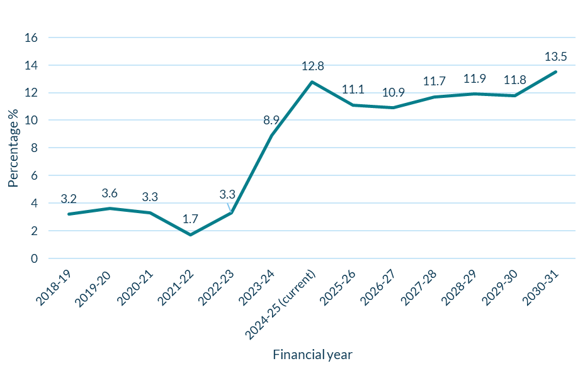With businesses facing sustained challenges from high energy costs, industry and policymakers alike will need to explore urgent reforms to ensure energy pricing helps, rather than hinders, the ability of businesses to adapt and remain resilient during these challenging times.
Dr Craig Lowrey Principal Consultant
Businesses across the UK are facing mounting financial pressures as steep increases in energy standing charges diminish their ability to cut bills. Forecasts from Cornwall Insight reveal that standing charges - costs paid regardless of energy consumption or the time it is used – are set to remain three to four times higher as a proportion of energy bills compared to the start of the decade, staying at these levels through to 2030. As a result, energy-saving strategies, such as avoiding peak-time usage, will continue to be considerably less effective in lowering overall bills.
The analysis, part of Cornwall Insight’s Business Energy Cost Forecast, shows that standing charges for a typical small industrial consumer1, such as large retail and leisure sites, have increased from £31 per day (3.2% of total energy bills) in 2018 to £190 per day (12.8% of total energy bills) in 2024. This represents a sixfold rise in cost terms and a fourfold increase as a share of overall bills. Projections indicate that by 2030 this will climb to around £211 per day, representing approximately 13.5% of bills.
These increases reflect the ongoing Targeted Charging Review (TCR), which has significantly reshaped how network charges and other system costs are collected, and the regular price control review process undertaken by Ofgem. Previously a higher proportion of these costs were recovered through the unit charge, so, businesses who were able to lower their consumption and reduce use at peak times paid less of the charges. As part of the regulator’s aim to ensure all users of the electricity network were paying their fair share of the costs, more of the charges were moved over to the standing charge.
The rise in the charges has impacted many businesses bottom lines, leaving fewer opportunities for them to benefit from reducing their energy consumption or adopting innovative, flexible approaches to how and when they use power. While opportunities to reduce costs and generate revenue are still present, such as through the Demand Flexibility Service, the effectiveness of traditional practices like Triad avoidance - previously used by businesses to cut transmission network charges by reducing demand during the three highest-demand half-hour periods - have been severely impacted.
As part of its pre-election manifesto, the now Labour Government stated that it intended to work with Ofgem to reduce standing charges. In August 2024, Ofgem published an options paper to discuss reducing standing charges for households, in which it noted that there will be a planned re-examination of network charges and how system costs are recovered from all users, including businesses. This may result in some of the standing charge costs being shifted back to unit costs - seeing the return of off-peak savings.
Figure 1: Total cost proportion of standing charge (%) actual and projections

Source: Cornwall Insight
Dr Craig Lowrey, Principal Consultant at Cornwall Insight:
"The rapid rise in standing charges is making it harder for businesses to take control of their energy costs. Without action, it risks wiping out incentives to adopt smarter energy strategies, leaving businesses struggling to cut bills. Given that energy bills are already a significant strain on bottom lines, the standing charge levels are a further challenge to businesses and their ability to manage their energy costs and use, with potential impacts on their wider operation.
“With businesses facing sustained challenges from high energy costs, industry and policymakers alike will need to explore urgent reforms to ensure energy pricing helps, rather than hinders, the ability of businesses to adapt and remain resilient during these challenging times. Such measures are crucial not only for safeguarding businesses' survival but also for fostering a more flexible and efficient energy landscape for the future.”
Reference:
- Large retail and leisure sites with an average annual electricity demand of 2.33GWh
- Ends
Notes to Editors
For more information, please contact: Verity Sinclair at v.sinclair@cornwall-insight.com To link to our website, please use: https://www.cornwall-insight.com/
Copyright disclaimer for commercial use of the press releases: The content of the press release, including but not limited to text, data, images, and graphics, is the sole property of Cornwall Insight and is protected by UK copyright law. Any redistribution or reproduction of part or all of the content in any form for commercial use is prohibited without the prior written consent of Cornwall Insight.
Media Use Exemption: The information included in this press release may be used by members of the media for news reporting purposes only. Any other commercial use of this information is prohibited without the prior written consent of Cornwall Insight. All non-media use is prohibited, including redistribution, reproduction, or modification of our content in any form for commercial purposes, and requires prior written consent. Please contact: enquiries@cornwall-insight.com
About the Cornwall Insight Group Cornwall Insight is a leading provider of research, analysis, consulting and training to businesses and stakeholders engaged in the Great British, Irish and Australian energy markets. To support our customers, we leverage a powerful combination of analytical capability, a detailed appreciation of regulation codes and policy frameworks, and a practical understanding of how markets function.

